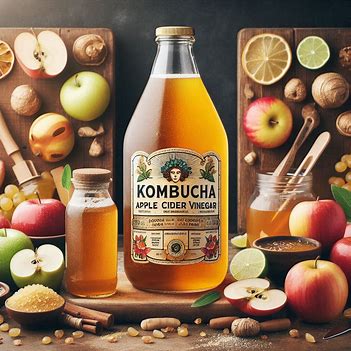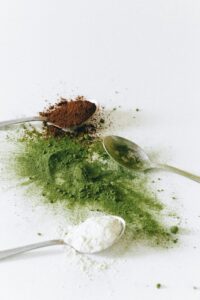Overview : Kombucha vs Apple Cider Vinegar Comparison

In the expanding world of fermented health beverages, kombucha and apple cider vinegar have gained immense popularity for their purported health benefits. While both (Kombucha vs Apple Cider Vinegar) originate from fermentation processes, they differ significantly in composition, taste, nutritional profile, and potential health applications. This comprehensive guide Kombucha vs Apple Cider Vinegar comparison explores everything you need to know about these two powerful functional beverages, including their production methods, nutritional profiles, evidence-based health benefits, and practical guidelines for incorporating them into your wellness routine.
Table of Contents
What is Kombucha? (Kombucha vs Apple Cider Vinegar)

Kombucha is a fermented tea beverage with ancient origins dating back approximately 2,000 years to Northeast China. This effervescent drink is created through a specific fermentation process involving a symbiotic culture of bacteria and yeast (SCOBY).
Production Process
- Base Preparation: The process begins with brewing black or green tea and dissolving sugar in it.
- SCOBY Addition: Once cooled, the SCOBY (which resembles a flat, gelatinous pancake) is added to the sweetened tea.
- Fermentation: During fermentation (typically 7-14 days), the SCOBY consumes the sugar, producing organic acids, vitamins, and probiotics.
- Secondary Fermentation: Many producers conduct a second fermentation phase where fruits, herbs, or spices are added to enhance flavor and nutritional content.
Nutritional Profile
Kombucha typically contains:
- Probiotics: Various beneficial bacteria (primarily Acetobacter) and yeasts
- Organic acids: Acetic, gluconic, and lactic acids
- B vitamins: Particularly B1, B6, B12
- Antioxidants: Especially when made from green tea
- Calories: Approximately 30-50 calories per 8 oz serving
- Sugar: 2-8g per 8 oz (significantly reduced from initial brewing)
- Alcohol: Trace amounts (typically 0.5% or less)
What is Apple Cider Vinegar? (Kombucha vs Apple Cider Vinegar)

Apple cider vinegar (ACV) is made from fermented apple juice and has been used for centuries in cooking and natural medicine. Its distinctive tangy flavor and numerous health applications have made it a staple in many households.
Production Process
- Crushing and Extraction: Apples are crushed and their juice is extracted.
- First Fermentation: Yeast is added to the apple juice, converting sugars to alcohol.
- Secondary Fermentation: Acetobacter bacteria convert the alcohol into acetic acid.
- Maturation: The vinegar is aged, developing its characteristic flavor profile.
- Filtration (Optional): Some commercial varieties are filtered and pasteurized, while raw, unfiltered versions contain the “mother” – a colony of beneficial bacteria.
Nutritional Profile
Apple cider vinegar typically contains:
- Acetic acid: The primary active compound (5-6%)
- Polyphenols: Plant compounds with antioxidant properties
- Potassium: Small amounts per serving
- Amino acids: Various in small quantities
- Calories: Approximately 3 calories per tablespoon
- Sugar: Minimal (less than 1g per tablespoon)
- pH level: Highly acidic (2-3 pH)
Key Differences Between Kombucha and Apple Cider Vinegar (Kombucha vs Apple Cider Vinegar)

Composition and Taste
Kombucha:
- Base ingredients: Tea (usually black or green) and sugar
- Flavor profile: Slightly sweet, tangy, and effervescent
- Texture: Typically carbonated with a smooth mouthfeel
- Versatility: Available in numerous flavor variations
Apple Cider Vinegar:
- Base ingredients: Apple juice
- Flavor profile: Sharp, intensely acidic, and strongly apple-forward
- Texture: Liquid with varying viscosity depending on filtration
- Versatility: Primarily used in diluted form or as a culinary ingredient
Health Benefits: Evidence-Based Comparison (Kombucha vs Apple Cider Vinegar Comparison)

Digestive Health
Kombucha:
- Contains multiple strains of probiotics that may support gut microbiome diversity
- May improve digestion and reduce symptoms of irritable bowel syndrome (IBS)
- The organic acids present may aid in nutrient absorption
Apple Cider Vinegar:
- May stimulate digestive enzyme production
- Can help alleviate indigestion and heartburn for some individuals
- Research suggests it may slow gastric emptying, potentially aiding digestion
A study published in the Journal of Medicinal Food found that regular consumption of fermented beverages like kombucha was associated with improved gut microbiota composition, while research in the International Journal of Obesity indicated that acetic acid in ACV might influence satiety pathways that affect digestion https://academic.oup.com/jmf.
Blood Sugar Management
Kombucha:
- Limited research, but some studies suggest potential benefits for glycemic control
- Preliminary evidence indicates it might improve insulin sensitivity
- Effects may be influenced by the type of tea used as a base
Apple Cider Vinegar:
- Multiple clinical trials have shown ACV can improve insulin sensitivity
- May reduce blood sugar spikes after carbohydrate-rich meals
- A 2019 systematic review found consistent evidence for ACV’s modest effect on post-meal glucose levels
Research published in the Journal of Evidence-Based Integrative Medicine demonstrated that vinegar consumption before meals reduced postprandial glucose by approximately 20% compared to placebo controls https://journals.sagepub.com/doi/10.1177/2156587217743152.
Weight Management
Kombucha:
- Low in calories compared to many other beverages
- May support weight management by replacing higher-calorie drinks
- Contains compounds that could potentially increase metabolism
Apple Cider Vinegar:
- Multiple studies suggest it may support weight loss
- May increase feelings of fullness, potentially reducing caloric intake
- A 2018 study found that participants consuming 2 tablespoons daily for 12 weeks experienced modest weight loss
According to research published in the Journal of Functional Foods, daily ACV consumption led to reduced body weight, BMI, and waist circumference after a 12-week intervention period https://www.sciencedirect.com/journal/journal-of-functional-foods.
Antioxidant Properties
Kombucha:
- Rich in polyphenols, especially when made with green tea
- Contains various antioxidant compounds that may neutralize free radicals
- Fermentation process may enhance the bioavailability of antioxidants
Apple Cider Vinegar:
- Contains phenolic compounds that function as antioxidants
- Unfiltered varieties contain more antioxidants than filtered ones
- May help reduce oxidative stress in the body
The Journal of Food Science published research showing that kombucha demonstrated significant antioxidant activity, with green tea kombucha showing particularly high levels of radical scavenging properties https://ift.onlinelibrary.wiley.com/journal/17503841.
Immune System Support
Kombucha:
- Contains vitamin C and other immune-supporting compounds
- Probiotics may enhance immune function through gut-brain axis
- Some evidence suggests it may have antimicrobial properties
Apple Cider Vinegar:
- Traditional use as an antimicrobial agent
- May help support immune function through gut health
- Contains trace minerals that support immune system functioning
Potential Side Effects and Precautions (Kombucha vs Apple Cider Vinegar Comparison)
Kombucha Considerations
- Caffeine Content: As it’s made from tea, kombucha contains caffeine, which may affect sensitive individuals.
- Sugar Content: Commercial varieties may contain added sugars; always check nutrition labels.
- Alcohol Content: Though minimal, kombucha contains trace amounts of alcohol.
- Dental Health: The acidity may potentially affect tooth enamel with frequent consumption.
- Contamination Risk: Homebrewed kombucha carries risks if not prepared correctly.
- Drug Interactions: May interact with certain medications due to its probiotic content.
Apple Cider Vinegar Considerations
- High Acidity: Can damage tooth enamel and potentially irritate the esophagus if consumed undiluted.
- Digestive Discomfort: May cause nausea or indigestion in some individuals.
- Potassium Depletion: Excessive consumption may lower potassium levels.
- Medication Interactions: Can potentially interact with diabetes medications and certain diuretics.
- Delayed Gastric Emptying: May worsen symptoms in people with gastroparesis.
- Skin Irritation: Topical application should be diluted to prevent burns or irritation.
How to Incorporate These Beverages Into Your Routine
Optimal Consumption of Kombucha
Dosage Recommendations:
- Beginners: Start with 4 ounces daily to assess tolerance
- Regular consumers: 8-16 ounces daily, preferably divided into two servings
- Maximum recommended: No more than 32 ounces daily
Best Times for Consumption:
- Mid-morning: For energy without the caffeine crash
- With meals: To aid digestion
- Post-workout: For rehydration with added benefits
Creative Ways to Enjoy Kombucha:
- As a base for smoothies
- In salad dressings
- As a mocktail ingredient
- Frozen into popsicles
- In marinades for meat or vegetables
Optimal Consumption of Apple Cider Vinegar
Dosage Recommendations:
- Standard therapeutic dose: 1-2 tablespoons (15-30ml) daily, always diluted
- Beginners: Start with 1 teaspoon in a glass of water
- Maximum recommended: No more than 2 tablespoons daily
Best Times for Consumption:
- Before meals: May help with blood sugar management
- Morning routine: Many prefer taking it first thing in the morning
- Before bedtime: Some report improved sleep quality
Creative Ways to Use Apple Cider Vinegar:
- In homemade salad dressings
- Added to smoothies (small amounts)
- In marinades and sauces
- Mixed with honey and warm water as a soothing drink
- Diluted as a facial toner
Making Your Own Kombucha and Apple Cider Vinegar (Kombucha vs Apple Cider Vinegar Comparison)
Homemade Kombucha Guide
Basic Ingredients:
- 8 cups of filtered water
- 1/2 cup white sugar
- 4-6 tea bags (black or green tea)
- 1 SCOBY with 1 cup starter liquid
- Glass container (never metal or plastic)
Simple Process:
- Brew tea with sugar and allow to cool completely
- Add SCOBY and starter liquid
- Cover with breathable cloth and secure with rubber band
- Ferment in a warm, dark place for 7-14 days
- Bottle for second fermentation if desired
Safety Tips:
- Always use clean, sanitized equipment
- Watch for signs of mold or contamination
- Maintain proper pH levels (below 4.5)
- Store properly after brewing
Homemade Apple Cider Vinegar Guide
Basic Ingredients:
- Apple scraps (cores and peels) or whole apples
- Sugar or honey
- Filtered water
- Glass container
Simple Process:
- Fill jar 3/4 full with apple scraps
- Dissolve 1 tablespoon of sugar per cup of water and pour over apples
- Cover with breathable cloth and secure
- Ferment in a warm, dark place for 3-4 weeks
- Strain out solids and continue fermenting for another 3-4 weeks
Safety Tips:
- Use organic apples when possible
- Ensure all equipment is thoroughly cleaned
- Keep apple scraps fully submerged
- Look for the formation of the “mother” as a sign of successful fermentation
Which One Should You Choose?
Kombucha Might Be Better For You If:
- You want a probiotic-rich beverage that’s enjoyable to drink
- You’re looking for a soda or alcohol alternative
- You prefer a ready-to-drink option
- You enjoy carbonated beverages
- You’re sensitive to strong acidic tastes
- You want a variety of flavors and options
Apple Cider Vinegar Might Be Better For You If:
- You’re specifically targeting blood sugar management
- You want a versatile ingredient for cooking and health
- You prefer small doses rather than drinking a full beverage
- You’re looking for a more budget-friendly option
- You need something with a longer shelf life
- You want something with minimal calorie content
Consider Using Both If: (Kombucha vs Apple Cider Vinegar Comparison)
- You have multiple health goals that align with the benefits of each
- You enjoy variety in your wellness routine
- You want to leverage the different nutritional profiles for complementary benefits
- You’re targeting both digestive health and metabolic support
Expert Insights: What Nutritionists and Ayurvedic Practitioners Say (Kombucha vs Apple Cider Vinegar Comparison)
According to registered dietitian Lisa Moskovitz, “Both kombucha and apple cider vinegar offer unique benefits, but it’s important to remember they are supplements to, not replacements for, a balanced diet” https://www.eatthis.com/apple-cider-vinegar-vs-kombucha/.
From an Ayurvedic perspective, Dr. Vasant Lad notes that fermented foods like kombucha may help balance Vata dosha, while the warming properties of apple cider vinegar can help pacify Kapha dosha when used appropriately https://www.ayurveda.com/resources/articles/ayurveda-and-fermented-foods.
Frequently Asked Questions
Q: Can I drink kombucha and apple cider vinegar together? A: Yes, they can be consumed on the same day, but it’s best to space them out rather than mixing them directly. Start with small amounts of each to assess your tolerance.
Q: Is store-bought kombucha as beneficial as homemade? A: Commercial kombucha can be beneficial, but check labels for added sugars and pasteurization, which may reduce probiotic content. Quality varies widely between brands.
Q: Can apple cider vinegar help with acid reflux? A: While some people report relief, ACV may worsen symptoms for others. Start with very diluted amounts and consult a healthcare provider if you have chronic acid reflux.
Q: Is there anyone who should avoid these beverages? A: People with certain medical conditions (including diabetes, digestive disorders, or histamine intolerance) should consult healthcare providers before regular consumption. Pregnant women should also exercise caution.
Q: How long do homemade versions last? A: Properly stored homemade kombucha typically lasts 1-3 months refrigerated. Homemade apple cider vinegar can last indefinitely if properly prepared and stored.
Conclusion
Both kombucha and apple cider vinegar (Kombucha vs Apple Cider Vinegar) offer unique health benefits backed by varying degrees of scientific evidence. Kombucha provides a probiotic-rich, refreshing beverage experience with potential digestive and immune benefits, while apple cider vinegar offers a concentrated dose of acetic acid with promising effects on blood sugar and weight management.
The best choice depends on your personal health goals, taste preferences, and lifestyle factors. Many health enthusiasts incorporate both into their routines for complementary benefits. As with any wellness supplement, moderation is key, and it’s important to introduce these fermented products gradually into your diet while monitoring how your body responds.
Remember that while these functional beverages can support wellbeing, they work best as part of a balanced diet and healthy lifestyle rather than as miracle solutions. Consider consulting with healthcare providers before making significant changes to your diet, especially if you have underlying health conditions.





Pingback: 7 Ways Kombucha vs Apple Cider Vinegar Weight Loss
Pingback: Dave's Hot Chicken Nutrition Facts: Complete Guide
Pingback: Does Green Superfood Powder Expire? 7 Critical Facts
Pingback: 7 Best PCOS Herbal Tea for Hormonal Balance: Science-Backed